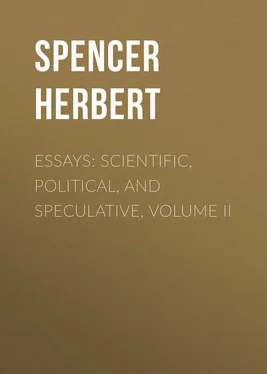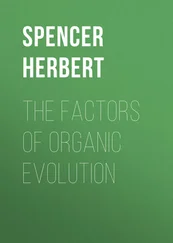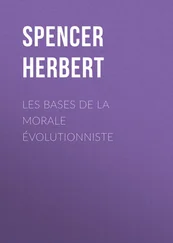Herbert Spencer - Essays - Scientific, Political, and Speculative, Volume II
Здесь есть возможность читать онлайн «Herbert Spencer - Essays - Scientific, Political, and Speculative, Volume II» — ознакомительный отрывок электронной книги совершенно бесплатно, а после прочтения отрывка купить полную версию. В некоторых случаях можно слушать аудио, скачать через торрент в формате fb2 и присутствует краткое содержание. Жанр: Философия, foreign_antique, foreign_prose, sketch, на английском языке. Описание произведения, (предисловие) а так же отзывы посетителей доступны на портале библиотеки ЛибКат.
- Название:Essays: Scientific, Political, and Speculative, Volume II
- Автор:
- Жанр:
- Год:неизвестен
- ISBN:нет данных
- Рейтинг книги:5 / 5. Голосов: 1
-
Избранное:Добавить в избранное
- Отзывы:
-
Ваша оценка:
- 100
- 1
- 2
- 3
- 4
- 5
Essays: Scientific, Political, and Speculative, Volume II: краткое содержание, описание и аннотация
Предлагаем к чтению аннотацию, описание, краткое содержание или предисловие (зависит от того, что написал сам автор книги «Essays: Scientific, Political, and Speculative, Volume II»). Если вы не нашли необходимую информацию о книге — напишите в комментариях, мы постараемся отыскать её.
Essays: Scientific, Political, and Speculative, Volume II — читать онлайн ознакомительный отрывок
Ниже представлен текст книги, разбитый по страницам. Система сохранения места последней прочитанной страницы, позволяет с удобством читать онлайн бесплатно книгу «Essays: Scientific, Political, and Speculative, Volume II», без необходимости каждый раз заново искать на чём Вы остановились. Поставьте закладку, и сможете в любой момент перейти на страницу, на которой закончили чтение.
Интервал:
Закладка:
Herbert Spencer
Essays: Scientific, Political, and Speculative; Vol. II of Three Library Edition (1891), Containing Seven Essays not before Republished, and Various other Additions
THE GENESIS OF SCIENCE
There still prevails among men a vague notion that scientific knowledge differs in nature from ordinary knowledge. By the Greeks, with whom Mathematics – literally things learnt – was alone considered as knowledge proper, the distinction must have been strongly felt; and it has ever since maintained itself in the general mind. Though, considering the contrast between the achievements of science and those of daily unmethodic thinking, it is not surprising that such a distinction has been assumed; yet it needs but to rise a little above the common point of view, to see that it is but a superficial distinction. The same faculties are employed in both cases; and in both cases their mode of operation is fundamentally the same. If we say that science is organized knowledge, we are met by the truth that all knowledge is organized in a greater or less degree – that the commonest actions of the household and the field presuppose facts colligated, inferences drawn, results expected; and that the general success of these actions proves the data by which they were guided to have been correctly put together. If, again, we say that science is prevision – is a seeing beforehand – is a knowing in what times, places, combinations, or sequences, specified phenomena will be found; we are obliged to confess that the definition includes much that is foreign to science in its ordinary acceptation: for example, a child’s knowledge of an apple. This, as far as it goes, consists in previsions. When a child sees a certain form and colours, it knows that if it puts out its hand it will have certain impressions of resistance, and roundness, and smoothness; and if it bites, a certain taste. And manifestly its general acquaintance with surrounding objects is of like nature – is made up of facts concerning them, grouped so that any part of a group being perceived, the existence of the other facts included in it is foreseen. If, once more, we say that science is exact prevision, we still fail to establish the supposed difference. Not only do we find that much of what we call science is not exact, and that some of it, as physiology, can never become exact; but we find further, that many of the previsions constituting the common stock alike of wise and foolish, are exact. That an unsupported body will fall; that a lighted candle will go out when immersed in water; that ice will melt when thrown on the fire – these, and many like predictions relating to the familiar properties of things, have as high a degree of accuracy as predictions are capable of. It is true that the results foreseen are of a very general character; but it is none the less true that they are correct as far as they go: and this is all that is requisite to fulfil the definition. There is perfect accordance between the anticipated phenomena and the actual ones; and no more than this can be said of the highest achievements of the sciences specially characterized as exact.
Seeing thus that the assumed distinction between scientific knowledge and common knowledge cannot be sustained; and yet feeling, as we must, that however impossible it may be to draw a line between them, the two are not practically identical; there arises the question – What is the relationship between them? A partial answer to this question may be drawn from the illustrations just given. On reconsidering them, it will be observed that those portions of ordinary knowledge which are identical in character with scientific knowledge, comprehend only such combinations of phenomena as are directly cognizable by the senses, and are of simple, invariable nature. That the smoke from a fire which she is lighting will ascend, and that the fire will presently boil the water placed over it, are previsions which the servant-girl makes equally well with the most learned physicist; but they are previsions concerning phenomena in constant and direct relation – phenomena that follow visibly and immediately after their antecedents – phenomena of which the causation is neither remote nor obscure – phenomena which may be predicted by the simplest possible act of reasoning. If, now, we pass to the previsions constituting science – that an eclipse of the moon will happen at a specified time; that when a barometer is taken to the top of a mountain of known height, the mercurial column will descend a stated number of inches; that the poles of a galvanic battery immersed in water will give off, the one an inflammable and the other an inflaming gas, in definite ratio – we perceive that the relations involved are not of a kind habitually presented to our senses. They depend, some of them, on special combinations of causes; and in some of them the connexion between antecedents and consequents is established only by an elaborate series of inferences. A broad distinction, therefore, between scientific knowledge and common knowledge is its remoteness from perception. If we regard the cases in their most general aspect, we see that the labourer who, on hearing certain notes in the adjacent hedge, can describe the particular form and colours of the bird making them, and the astronomer who, having calculated a transit of Venus, can delineate the black spot entering on the sun’s disc, as it will appear through the telescope, at a specified hour, do essentially the same thing. Each knows that on fulfilling the requisite conditions, he shall have a preconceived impression – that after a definite series of actions will come a group of sensations of a foreknown kind. The difference, then, is neither in the fundamental character of the mental acts; nor in the correctness of the previsions accomplished by them; but in the complexity of the processes required to achieve the previsions. Much of our common knowledge is, as far as it goes, precise. Science does not increase its precision. What then does it do? It reduces other knowledge to the same degree of precision. That certainty which direct perception gives us respecting coexistences and sequences of the simplest and most accessible kind, science gives us respecting coexistences and sequences, complex in their dependencies, or inaccessible to immediate observation. In brief, regarded from this point of view, science may be called an extension of the perceptions by means of reasoning .
On further considering the matter, however, it will perhaps be felt that this definition does not express the whole fact – that inseparable as science may be from common knowledge, and completely as we may fill up the gap between the simplest previsions of the child and the most recondite ones of the physicist, by interposing a series of previsions in which the complexity of reasoning involved is greater and greater, there is yet a difference between the two beyond that above described. And this is true. But the difference is still not such as enables us to draw the assumed line of demarcation. It is a difference not between common knowledge and scientific knowledge; but between the successive phases of science itself, or knowledge itself – whichever we choose to call it. In its earlier phases science attains only to certainty of foresight; in its later phases it further attains to completeness . We begin by discovering a relation; we end by discovering the relation. Our first achievement is to foretell the kind of phenomenon which will occur under specified conditions; our last achievement is to foretell not only the kind but the amount . Or, to reduce the proposition to its most definite form – undeveloped science is qualitative prevision; developed science is quantitative prevision.
Читать дальшеИнтервал:
Закладка:
Похожие книги на «Essays: Scientific, Political, and Speculative, Volume II»
Представляем Вашему вниманию похожие книги на «Essays: Scientific, Political, and Speculative, Volume II» списком для выбора. Мы отобрали схожую по названию и смыслу литературу в надежде предоставить читателям больше вариантов отыскать новые, интересные, ещё непрочитанные произведения.
Обсуждение, отзывы о книге «Essays: Scientific, Political, and Speculative, Volume II» и просто собственные мнения читателей. Оставьте ваши комментарии, напишите, что Вы думаете о произведении, его смысле или главных героях. Укажите что конкретно понравилось, а что нет, и почему Вы так считаете.












